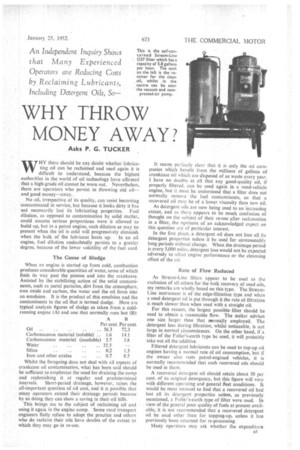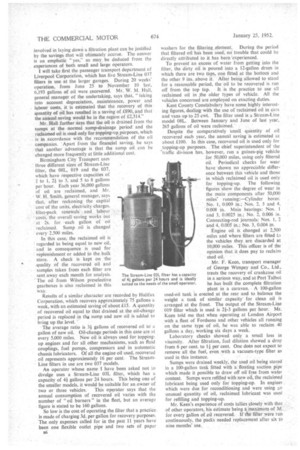WHY THROW MONEY AWAY?
Page 39

Page 40

If you've noticed an error in this article please click here to report it so we can fix it.
Asks P. G. TUCKER WHY there should be any doubt whether lubricating oil can be reclaimed and used again it is difficult to understand, because the highest authorities in the world of oil technology have affirmed that a high-grade oil cannot be worn out. Nevertheless, there are operators who persist in throwing old oil— and good money—away.
No oil, irrespective of its quality, can resist becoming contaminated in service, but because it looks dirty it has . not necessarily lost its lubricating properties. Fuel dilution, as opposed to contamination by solid matter, could assume serious proportions were it allowed to build up, but in a petrol engine, such dilution as may be • present when the oil is cold will progressively diminish when the bulk of the lubricant heats up. In an oil engine, fuel dilution undoubtedly persists to a greater degree, because of the lower volatility of thefuel used.
The Cause of Sludge When an engine is started up from cold, combustion produces considerable quantities of water, some of which finds its way past the pistons and into the crankcase. Assisted by the stabilizing action of the solid contaminents, such as metal particles, dirt from the atmosphere, iron oxide and carbon, the water and the oil form into an emulsion. It is the product of this emulsion and the contaminents in the oil that is termed sludge. Here are typical analysis figures of sludge as taken from a coldrunning engine (A) and one that normally runs hot (B):
Whilst the foregoing does not deal with all aspects of crankcase oil contamination, what has been said should be sufficient to emphasize the need for draining the sump and replenishing it at regular and predetermined intervals. Short-period drainage, however, raises the all-important question of oil cost, and it is possible that many operators extend their drainage periods because by so doing they can show a saving in their oil bills.
This brings me to the subject of reclaiming oil and using it again in the engine sump. Some road transport engineers flatly refuse to adopt the practice and others who do reclaim their oils have doubts of the extent to which they may go in re-use. It seems perfectly clear that it is only the oil companies which. benefit from the millions of gallons of crankcase oil which are disposed of as waste every year. I have no doubts at all that any good-quality oil, if properly filtered, can be used again in a road-vehicle engine, but it must be understood that a filter does not normally remove the fuel contaminents, so that a recovered oil may be of a lower viscosity than new oil.
As detergent oils are now being used to an increasing extent, and as there appears to be much confusion of thought on the subject of their re-use after reclamation in a filter, the opinions of an acknowledged expert on this question are of particular interest.
In the first place, a detergent oil does not lose all its detergent properties unless it be used for unreasonably long periods without change. When the drainage period is every 5,000 miles, detergent loss would not be expected adversely to affect engine performance or the clean.sing effect of the oil.
Rate of Flow Reduced As Stream-Line filters appear to be used to the exclusion of all others for the bulk recovery of used oils, my remarks are wholly based on this type. The StreamLine instrument is of the edge-filtration type and when a used detergent oil is put through it the rate of filtration is much slower than when used with a straight oil.
For this reason, the largest possible. filter should be used to obtain a reasonable flow. The maker advises one .size larger than that mormally employed. The detergent loss during filtration, whilst noticeable, is not large in normal circumstances, On the other hand, if a filter of the Fuller's-earth type be used, it will probably take out all the additive.
Filtered detergent lubricants can be used to top-up oil
engines having a normal rate of oil consumption, but if the owner also runs petrol-engined vehicles, it is normally recommended that such recovered oils should be used in them.
• A recovered detergentoil should retain about 50 per cent. of its original detergency, but this figure will vary with different operating and general fleet conditions. It would be most unusual to find that a recovered oil had lost all its detergent properties unless, as previously mentioned; a Fuller's-earth. type of filter were used. In view of the general poor cmality of fuels at present available, it is not recommended that a recovered detergent oil be used other than for topping-up, unless it has
previously been returned for re-processing. .
Many operators may ask whether the .expenditure
involved in laying down a filtration plant can be justified by the savings that will ultimately accrue. The answer is an emphatic "yes," as may be deduced from the experiences of both small and large operators.
I will take first the passenger transport department of Liverpool Corporation, which has five Stream-Line 037 filters in use at the larger garages. During 20 weeks' operation, from June 25 to November 10 last, 6,193 gallons of oil were recovered. Mr. W. M. Hall, general manager of the undertaking, says that, "taking into account depreciation, maintenance, power and labour costs, it is estimated that the recovery of this• quantity of oil has resulted in a saving of £890, and that • the annual saving would be in the region of 12,314."
Mr. Hall further Says that the oil is drained from the sumps at the normal sump-drainage period and the reclaimed oil is used only for topping-uRptirposes, which is in accordance with the recommendation of the oil companies. 'Apart from the financial saving, he says that another advantage is that the sump oil can be changed more frequently at little additional cost.
Birmingham City Transport uses • three different sizes of Stream-Line filter, the 08L, 019 and the 037, which have respective capacities of to 1, 24 to 3, and $ to 8 gallons per hour. Each year 36,000 gallons of oil are reclaimed, and Mr.
W. H. Smith, general manager, says that, after reckoning the capital cost of the units, electricity charges.
• filter-pack renewals and labour • costs, the •overall saving works but at 2s. for each gallon of oil "reclaimed. Sump oil is changed every 2,500 miles. • In this case, the reclaimed oil is ; regarded as being equal to new oil, and in consequence is used for replenishment or added to the bulk store. A check is kept on the -quality of the recovered oil and samples taken from each filter are sent away each month for analysis. ' The oil from Wilson preselective gearboxes is also reclaimed in this way.
Results of a similar character are recorded by Halifax Corporation, which recovers approximately 75 gallons a week, with an estimated saving of about £15. A quantity of recovered oil equal to that drained at the oil-change period is replaced in the sump and new oil is added to bring up the level. '
The average ratio is 34 gallons of recovered oil to a gallon of new oil. Oil-change periods in this case are at
every 5,000 miles. New oil is always used for topping up engines and for all other mechanisms, such as fluid couplings, fuel pumps, compressors and in automatic chassis lubricators. Of all the engine oil used, recovered oil represents approximately 16 per cent. The StreamLine filters in use are two 037 models.
An operator whose name I have been asked not to divulge uses a Stream-Line 03L filter, which has a capacity of 44 gallons per 24 hours, This being one of the smaller models, it would be suitable for an owner of two or three vehicles. This operator says that the annual consumption of recovered oil varies with the number of "oil burners" in the fleet, but an average figure is stated to be 160 gallons.
So low is the cost of operating the filter that a practice • is made of charging 3d. per gallon for recovery purposes. The only expenses called for in the past 11 years have been one flexible outlet pipe and two sets of paper a6 washers for the filtering ciement. During the period that filtered oil has been used, no trouble that could be directly attributed to it has been experienced.
To prevent an excess of water from getting into the
filter, the dirty oil is poured into a 12-gallon drum in which there are two taps, one fitted at the bottorri and the other 9 ins, above it. After being allowed to stand for a reasonable period, the oil to be recovered is run
off from the top tap. It is the practice to use all reclaimed oil in ,the older types of vehicle. All the vehicles concerned are employed on exacting duties.
Kent County Constabulary have some highly interest ing figures, dealing with the use of reclaimed oil in cars and vans tip to 25 cwt. The filter used is a Stream-Line model 08L. Between January and June of last year, 265 gallons of oil were reclaimed.
Despite the comparatively small quantity of oil
recovered each year, the annual saving.is estimated at about £100. In this case, recovered oil is used only for Lopping-up, purposes. The chief superintendent of the traffic division has, however, run a guinea-pig vehicle
for 50,000 miles, using only filtered
oil. Periodical checks for wear have shown no appreciable difference between this vehicle and those in which reclaimed oil is used only for topping-up. The following figures show the degree of wear in the main components after 50,000 miles running:.—Cylinder bores: No. 1, 0.009 in.; Nos_ 2, 3 and 4, 0.008 in. Main bearings: Nos. 1 and 3, 0.0025 in.; No. 2, 0.006 in. Connecting-rod journals: Nos. 1, 2 and 4,0.005 in.; No. 3, 0.004 in.
Engine oil is changed at 2,500 miles and where filters are fitted to the vehicles they are discarded at 10,000 miles. This officer is of the opinion that it does pay to reclaim used oil.
Mr. F. Keen, transport manager
of George Wimpey and Co., Ltd., treats the recovery of crankcase oil in a serious way, and at Port Talbot he has built the complete filtration
plant in a caravan. A 100-gallon
used-oil tank is erected at the rear and to balance the weight a tank of similar capacity for clean oil is arranged at the front. The output of the Stream,-Line 019 filter which is used is 24-3 gallons per hour. Mr. Keen told me that when operating at London Airport with a fleet of Fordsons and other vehicles all running on the same type of oil, he was able to reclaim 40 gallons a day, working six days a week.
Laboratory checks showed only a small loss in viscosity. After filtration, fuel dilution showed a drop from 6 per cent. to If per cent. One does not expect to remove all the fuel, even with a vacuum-type filter as used in this instance. • Sumps were drained weekly, the used oil being stored in a 100-gallon tank fitted with a'floating suction pipe which made it possible to draw off oil free from water content. Sumps were refilled with new oil, the reclaimed lubricant being used only for topping-up. In engines _ which were due for reconditioning and were using an unusual quantity of oil, reclaimed lubricant was used for refilling and topping-up.
Mr. Keen's experience of costs tallies closely with that
of other, operators, his estimate being a maximum of 3d. for every gallon of oil recovered. If the filter were run continuously, the packs •needed replacement after six to nine months' use. • '




















































































